News
Sri Lanka urged to take up robotic surgery
It is the new frontier in modern medicine – surgery with the use of small tools managed by a robotic arm. Behind the robotic arm, of course, is the surgeon, controlling it from a remote console.
Be the Asian centre for robotic surgery, is what Sri Lanka is being urged to achieve not just by one but two international specialists.
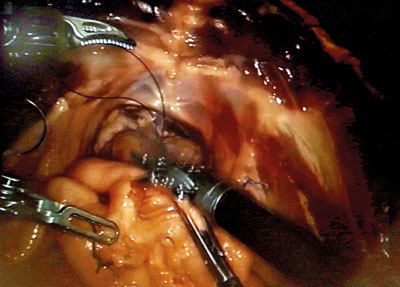
A robotic surgery procedure shown to doctors during the pre-congress workshop
For, one specialist who has achieved excellence in this emerging field is none other than Consultant Urological Surgeon Dr. Ranjan Thilagarajah of Sri Lankan origin (see box) while the other is Professor of Uro-Oncology John Kelly, both based in the United Kingdom.This is why robotic surgery is discussed at length at the pre-congress workshop in the auditorium of the Asiri Surgical Hospital, Narahenpita recently, before the 9th Annual Academic Sessions of the Sri Lanka Association of Urological Surgeons (SLAUS).
The vision to introduce robotic urology to Sri Lanka is also enunciated at
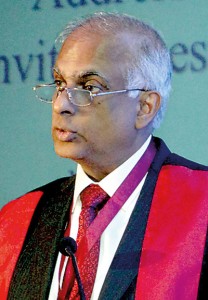
SLAUS President Dr. Anura Wijewardane addressing the inauguration of the 9th Annual Academic Sessions
the inauguration of the sessions at Hotel Ramada later by SLAUS President Dr. Anura Wijewardane who points out that “our trainees have shown an interest in this area and initiated training”. The example he cites is Dr A.P.I. Prabath, the newly-appointed Consultant Urologist in Badulla, the first to return to the country following training in robotic urology under the supervision of Dr. Thilagarajah.
“The future need for this treatment across Sri Lanka is great. Therefore, I believe we must continue to strive towards this aim over the coming years to ensure we deliver the best services to our population,” says Dr. Wijewardane.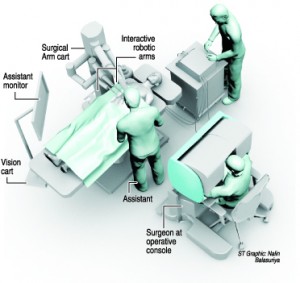
Pointing out that urology is a young specialty in Sri Lanka recognised by the Health Ministry in the early 1950s, he says that now there are 24 urologists, including two transplant surgeons in the state sector and four urologists in the private sector for a population of over 20 million. There are also five trainees who are due to join the service as consultants in the next 12 months.
Urological malignancies such as prostate, renal and bladder are rising, he says, attributing them to multi-factorial reasons such as lifestyle changes, the rising incidence of Metabolic
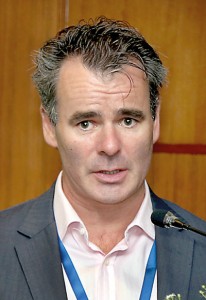
Prof. John Kelly
Syndrome, and early detection and increased awareness.
“The pressure on treatment is also rapidly increasing. Therefore, as a sector we need to develop the capacity and skills to face these challenges. We have striven to provide the best services to our population and I believe we stand at a great vantage point to build on the successes of our past,” adds Dr. Wijewardane.
Dr. Ranjan Thilagarajah, considered a pioneer in robotic surgery, explains its advantages during the pre-congress workshop.
“Robotic surgery, when introduced, should be for multi-specialties – gynaecological, upper gastro-intestinal, colorectal, prostate and bladder,” says Dr. Thilagarajah who is attached to Broomfield Hospital, Chelmsford, Essex, and got into this field in 2008.
Going into intricate detail in an interview with the Sunday Times, he says it is “delicate surgery using your hands and wrists, rather than the straight sticks when compared to laparoscopic interventions. If you are a laparoscopic or open surgeon, it is a straightforward switch to robotic surgery”.
In laparoscopic surgery, short, narrow tubes are inserted into the surgical work area through small incisions, after which long, narrow instruments are sent through these tubes for the surgeon to manipulate, cut and sew tissue.
However, in robotic surgery, explains Dr. Thilagarajah, it is like sitting inside the patient’s body itself. Here micro-surgery is done with 10 times magnification and full-wrist articulation, with suturing sometimes taking only 10 minutes, when previously it took a lot longer.Currently Dr. Thilagarajah is on sabbatical and heavily involved in a telemedicine project of CERNO Health, where at the touch of the screen of an i-Pad, patients and doctors from across the world can be linked up. Cases are being discussed by doctors across several continents, in China, the United Kingdom and Australia, in real time.
Assuring Sri Lanka of his support in introducing robotic surgery, Dr. Thilagarajah who has performed around 500 such surgeries says that one must shift from being consciously competent to unconsciously competent. “You are as good as your last case and each case must be considered as your first case, giving it equal importance. Otherwise, a sense of complacency may creep in.”
Reiterating that it is crucial to trust one’s team, he recalls an anxious moment during a kidney procedure. By the operating tableside was Surgeon Dr. A.P.I. Prabath from Sri Lanka who was in training in robotic surgery in the UK.
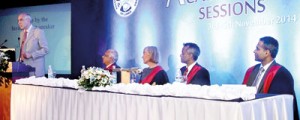
The inauguration of the 9th Annual Academic Sessions. From left: Guest speaker Dr. Julian Shah from the United Kingdom addressing the gathering while seated at the head table are SLAUS President Dr. Anura Wijewardane; Guest of Honour Dr. Suzie Venn and Chief Guest Dr. Ranjan Thilagarajah both from the UK; and SLAUS Secretary Dr. Ajith Malalasekera. Pix by M.A Pushpa Kumara and Indika Handuwala
“There was a sudden bleed during the procedure. All that the team saw was red. There was panic when they saw the blood and thought the patient was haemorrhaging, but it was just one spot of blood which had splashed onto the screen when a tiny blood vessel had been cut,” says Dr. Thilagarajah.
In such a ‘blindfolded’ situation, if everyone starts moving things around there would be confusion. So he calmed them down and with the graspers, guided them gently. “Left a bit, right a bit and forward and left,” Dr. Thilagarajah told them bringing the situation under control.
After each and every robotic surgery procedure, it is vital to have a de-briefing session, whether it has gone well or badly. Otherwise, the team members could suffer from something similar to Post-Traumatic Stress Disorder and have nightmares. Each team member gets his or her say and everyone gives ear to the other. “Before each procedure too we deconstruct fully and then reconstruct and that is how with each case the expertise grows,” he says, adding that you are as good as the weakest member of your team.
The wonder of robotic surgery, according to him is that the “patient would be out by lunch” even after complex surgery.
Prof. Kelly, meanwhile, tells Sri Lankan doctors who have hopes of getting into robotic surgery to “know your end-game”.
Do you want to be the Asian centre for robotic surgery or just be satisfied with doing radical prostatectomies, he asks, urging that before embarking into this field it is important to set up a governance structure.
His roots are in Sri LankaHe was born two years after his parents left Sri Lanka in 1962 for the United Kingdom, but for Dr. Ranjan Thilagarajah who was in Colombo for the SLAUS sessions, numerous have been the memorable journeys back to his parents’ roots and heritage.
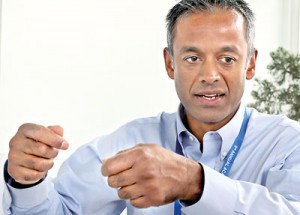 Dr. Ranjan Thilagarajah And this time, on his visit to Colombo, not only was he accompanied by his wife, Rebekah, a teacher, but also his five-year-old son, Nathaniel. Yes, the dinner conversation was medicine, smiles Dr. Thilagarajah, adding that there was never any doubt about what he and his younger brother wished to follow as their careers. “I loved surgery and went into this specialty quite early on,” he says simply. When asked why it was not orthopaedics, he is quick to answer that he always wanted to perform urological surgery. “I never wanted to be or was expected to follow my father’s footsteps too closely. My parents were of the view that we had to follow what we wanted to do.” So Dr. Thilagarajah’s pathway has been crystal clear – urological surgery and now robotic urological surgery. “Robotic surgery has a huge beneficial effect – it’s a win-win situation,” he adds. |

